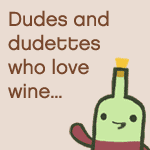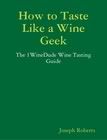To Whom It May Concern: I've just polished off another 1/2 of a bottle of your tasty, 14.5% abv wines... in fact, I'm pretty sure that even though it said 14.5% on the elegant bottle, it was probably closer to 15.2%. Anyway, I hope you'll forgive me if I stray off topic or get a little emotional. I'm sure you'll understand...
I've just polished off another 1/2 of a bottle of your tasty, 14.5% abv wines... in fact, I'm pretty sure that even though it said 14.5% on the elegant bottle, it was probably closer to 15.2%. Anyway, I hope you'll forgive me if I stray off topic or get a little emotional. I'm sure you'll understand...
I'm a wine lover. And I love California wines - in fact, they're the first wines that made me stand up and say "WOW! I think I'm in love with wine!" If it wasn't for CA wines, I would never have started my own personal and fulfilling journey into the wondrous world of wine.
So let's just establish right now that I've got a soft spot in my heart for CA wine. I even love a good fruit bomb every now and then, which I'd argue is one of the fingerprints of CA wine that makes it so unique on the world stage, and capable of being so damn good.
We've had a good run, you and me... BUT... things just aren't what they used to be...
Your wines... they're just starting to... well, I'll be honest, they're starting to seem a little boorish sometimes. And I have to admit, I've been finding myself attracted to other wine regions. Southern France, New Zealand, Chile...
I didn't expect this to happen. I thought we were happy together. But then things started to change. I understand that you need to 'chase scores sometimes in order to command high bottle prices for your wines. After all, how else can you afford to keep up with those expensive winemaking techniques... I know how difficult it is to upkeep pricey machinery, to hand-sort grapes, and let's not talk about the extravagant prices of new oak barrels these days!
I appreciate what you're up against, too; those Old World wine regions have hundreds of years going for them, and they can take a long range view of their wines. You have it tougher - sometimes, if you don't create a big, busty fruit bomb, you can't get your name out there quickly enough to be successful - and your competition sure isn't waiting around.
But it's all gone overboard now. I mean, do you have to obsess about Robert Parker's ratings all the time??!? I like the guy, but there are other palate preferences out there. Good ones, too. I love that you're busty with all of that alcohol and ripe fruit. It turns me on. But you used to be busty and elegant. Now... well... I'll let the pictures speak for themselves...
I love that you're busty with all of that alcohol and ripe fruit. It turns me on. But you used to be busty and elegant. Now... well... I'll let the pictures speak for themselves...
I'm not sure things can ever go back to being how they were.
But I'm willing to try if you are.
So please... for both of us... think twice before you go for that much alcohol. I'm not sure that any unfortified wine has enough fruit, acidity, and tenderness to balance against > 15% abv. Think about that, for you, for me. For us, and what we used to have together...
Love,
-Dude
(images: flikr.com - eduardolive, unknown)
An Open Letter to (Busty) California Winemakers
Old and In The Way?: The Future of Wine Criticism
 I just got through a ridiculously well-written article by Mike Steinberger, titled "Every one a critic: the future of wine writing" and available for download at CellarTracker.com (or in print in Issue 19 2008 of World of Fine Wine magazine). The man just has mad writing skills!
I just got through a ridiculously well-written article by Mike Steinberger, titled "Every one a critic: the future of wine writing" and available for download at CellarTracker.com (or in print in Issue 19 2008 of World of Fine Wine magazine). The man just has mad writing skills!
In the article, Steinberger discusses the factors that made Robert Parker such a force in the fine wine market, and how his retirement (Parker is now in his 60s) will leave a void in the world of wine criticism.
Steinberger offers the Internet voices of wine criticism as a potential for filling that void, since it is unlikely that anyone after Parker will have the clout, work ethic, and financial independence to take Parker's place (especially considering the outrageous prices that top-scoring First Growth Bordeaux and Grand Cru Burgundy can fetch nowadays - upwards of $1000 USD per bottle in some cases), and the Internet provides very low barriers to entry.
What was interesting for me was what Steinberger didn't touch on in his excellent article...
For starters, history has shown us that when you have a virtual dictator / enlightened despot (depending on your viewpoint) wielding such individual control and influence, as is the case with Parker, they hand-pick their successor in order to ensure the orderly hand-over of power, and to keep their vision alive. The followers, well, they follow. Think Putin in Russia, for example. So isn't it still possible that Parker may groom someone from within his own ranks at the Wine Advocate to take his place on the throne of Bordeaux wine critique?
I think we'd find that many Bordeaux, Rhone, and California wineries, and the Wine Advocate faithful, all of whom sometimes follow Parker's scores with almost religious fervor, would line up behind that pick with relatively little resistance.
The other thing that Steinberger didn't explore was the age range of the core Wine Advocate / Parker / Wine Spectator audience. I'd imagine (though I've no means to confirm this), that this group is aging right along with Parker. This isn't a dig on aging wine aficionados or critics (despite my arguably provocative post title); it's just an acknowledgment that there is currently a baby boomer generation driving the wine market, and that generation does things differently than the next one will when it comes to buying wine.
From Steinbergers article: "Certainly, the leading [wine] publications look to be in fairly ruddy health. Wine Spectator is a thriving franchise, and there is no reason to think this will change anytime soon."
Is this really true...? I wonder if the generation that comprises the Wine Spectator faithful isn't already being replaced in the marketplace by a new generation that expects to get their information from a broad range of expertise, validated by real-world experiences and real-time recommendations, and expects to get that information instantly via global social connections made over the Internet.
Call me crazy, but I don't see Wine Spectator, even with their on-line presence, fitting that bill...
One thing's for sure: Things are gonna get interesting from here!
Cheers!
(image: tralfaz-archives.com)
The Trouble With Wine Ratings (an Introduction to the 89 Project)
 Excellence.
Excellence.
You deserve it. You demand it.
It haunts you. It drives you.
It's so Powerful. It makes you. Speak. In Broken. Sentences.
We're obsessed with comparing things when we make purchases, especially in the U.S. Some of us are always out there looking for the best. Even in today's excellence-obsessed status-quo-chasing society, no one can blame you for just honestly wanting to get the most bang for your buck when it comes to buying wine. Especially when the economy is in the financial out house.
This is where you'd think that wine ratings would help you. By rating a wine on a 100 point scale, you can make a quick shopping determination so that you can pick up the best bottle for the money, and feel confident that you got a good deal and will enjoy your purchase without having to learn any of that fancy wine mumbo-jumbo, right?
Not quite.
If I was grading the 100 point wine rating scale (hell, why not, we love to rate stuff, remember?), I'd give it a C-. That's because the 100 point scale has 3 major flaws that prevent it from really telling you what you think it should tell you...
Flaw #1: It's actually a 50-point scale.
Yes, just like those exams you took in grade school, no one actually gets less than a 50. A wine gets a 50 just for showing up and writing its name (on the label). This would lead you to believe that, like those old grade school exams, the 100 point scale grades wines objectively. Which leads us to...
Flaw #2: It gives a false sense of Objectivity.
No one can really score a wine 100% objectively. This is because we all have differences in our palates, and therefore (at least) subtle differences in how we interpret a wine's flavor and quality. If a particular critic gives a wine a very high score, it says nothing about whether or not you might like that wine. So, unless your palate and preferences are similar to that critic, if you blindly buy one wine over another just because it scored a few points higher, you may be passing up a great wine that you would enjoy even more than that flashy 'high-scorer'. Flaw #3: It implies a "Scale" of Excellence.
Flaw #3: It implies a "Scale" of Excellence.
Like that old grade school grading method, you'd expect a wine scoring in the 90s to be better than a wine scoring in the 70s (an 'A' vs a 'C') - and for the most part, you'd be right. But is a wine that scores a 95 "better" than a wine that scores a 91? This is much trickier territory. A difference of a few points does not guarantee that one wine is better than another, any more than my scoring a 95 and you scoring a 91 on a wine exam guarantees that I'd be a better sommelier than you.
The trouble is that too many people fall into the trap of following the numbers for their buying decisions - so much so that a wine rated a 90+ will sell for a much higher price than a wine that scored an 89.
In order to help break out of some of the rut caused by this scoring system, a group of wine bloggers has started up a new blog called The 89 Project. The aim of the 89 Project is to highlight the wines that people are missing out on because of the 100 point system. I've signed on as a contributor, so watch that space for an update from me (once I get my dirty little hands on some tasty "89s").
In the explanation of his 100 point rating scale, Robert Parker sounds his own word of caution about blindly following his (or anyone else's) scores:"No scoring system is perfect, but a system that provides for flexibility in scores, if applied by the same taster without prejudice, can quantify different levels of wine quality and provide the reader with one professional's judgment. However, there can never be any substitute for your own palate nor any better education than tasting the wine yourself."
Well said. Don't say we didn't warn ya!
Cheers!
(images: wales.nhs.uk, modmyprofile.com)
Vinted on
Thursday, July 31, 2008
7
comments
Email This
![]()
Labels: 89 Project, best of, robert parker, wine review, wine tips
Stop Picking on Robert Parker (the Subjectivity of Wine Tasting)
 You can all stop picking on Robert Parker now.
You can all stop picking on Robert Parker now.
The oft-followed and just as oft-maligned wine critic extraordinaire is doing you a favor.
A favor if you, like him, have a wine palate that tends towards the bombastic, that is.
A great post on the science of wine tasting over at Catavino.net (and how that science can be manipulated) got me thinking about the subjectivity of wine critiquing in general, and more specifically on the philosophical question: Can wine tasting can ever be totally objective?
So for this topic, you can view this article as the yin to Catavino.net's yang. The conclusion of all of my philosophical pondering? All y'all need to cut Robert Parker some slack!
To bolster my exclamatory claim, let's turn to the (not too difficult) task of finding someone smarter than me to explain it...
According to Tim Crane's essay in Questions of Taste: The Philospohy of Wine:"A wine cannot be appreciated for its intrinsic value unless it is drunk; the value of the wine is intimately related to the kinds of experience to which it gives rise."
 In other words: the trouble with appreciation is that you need to taste wine to appreciate it (well, I suppose for some of us it's not really too much trouble). And because tasting itself is such a subjective act, it suggests that wine tasting is also at least somewhat subjective.
In other words: the trouble with appreciation is that you need to taste wine to appreciate it (well, I suppose for some of us it's not really too much trouble). And because tasting itself is such a subjective act, it suggests that wine tasting is also at least somewhat subjective.
Does our tasting subjectivity preclude us from coming to some general consensus of how a wine tastes, or its relative quality? Probably not. Throughout history, what was generally considered "good" wine has changed substanitally. In another essay from Questions of Taste, Barry C. Smith puts it like this:"Saying that the experience of tasting is a personal one need not prevent us from saying that it acquaints us with how a particular wine tastes, or from supposing that other people can be acquainted with that taste too."
Man, I am really digging smart philosophers right now! What does all of this have to do with wine critics like Parker? It suggests 2 things:
There are studies that back this up. Vinography.com recently reported on two such efforts that compare wine reviews by major wine critics (including Parker, of course) - with different taste preferences. These critics have been in very close agreement on which Bordeaux wines have been the best, and they've been agreeing for decades. So there's gotta be something to the "collective" wine palate as well as to our individual, subjective ones.
Back to Questions of Taste - also from Smith's essay:"Having the ability to asses and describe wines in one thing; having certain personal tastes is another. That we, and the wine critics, have personal tastes does not imply that all taste is subjective... Wine critics understand that they cannot overrule an individual's personal tastes... The moral is that we must find the right critic to advise us, the one whose personal tastes or preferences are more nearly aligned with ours."

So - we're all Right, and we're All right. Dig it.
Now give Parker a break. He's just trying to help out the people who like the fruit bombs. Including himself.
Cheers!
(images: palmspringslife.com, tuscany-cooking-class.com, winechocolate.org)
Vinted on
Tuesday, July 01, 2008
13
comments
Email This
![]()
Labels: best of, commentary, robert parker, wine tasting


























